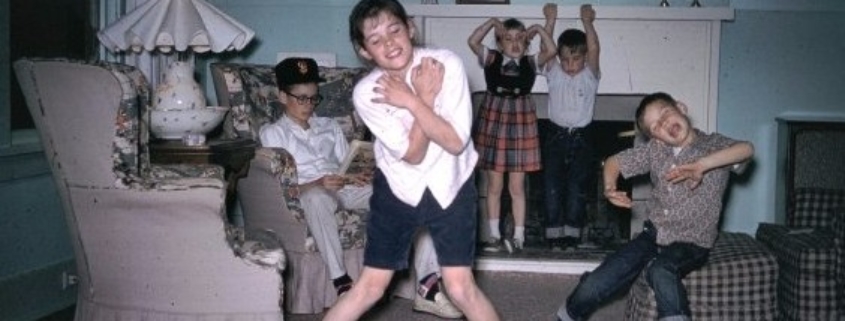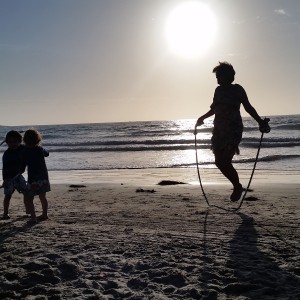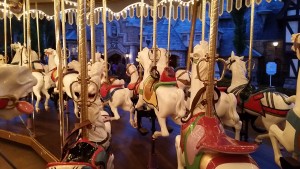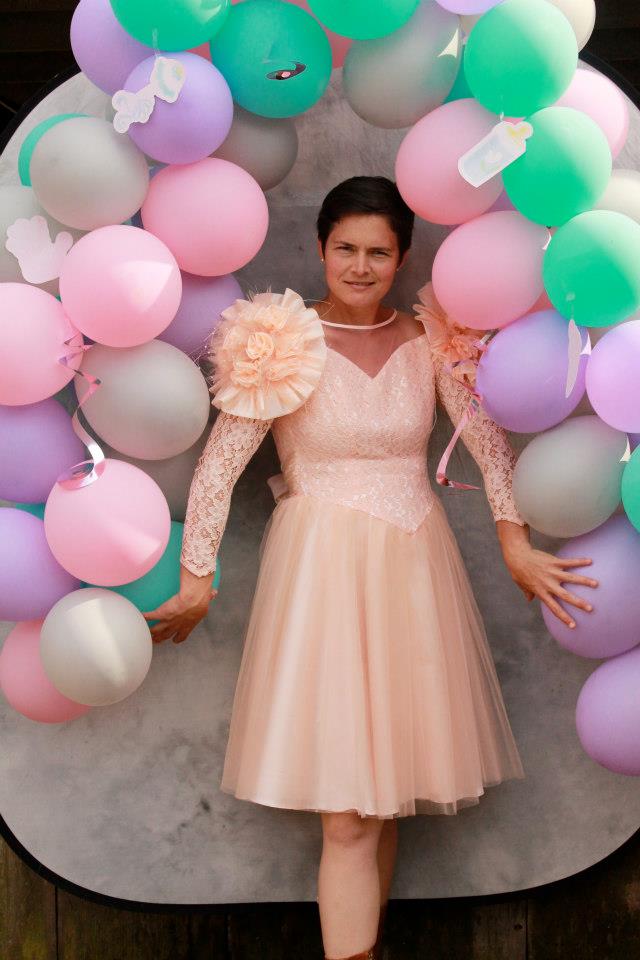Late Love Letter
When I need a book, I call my mother first. She volunteers at a library bookstore and sometimes you can get what you need there for fifty cents. My creative nonfiction mentor wanted me to read Joan Didion’s Slouching Towards Bethlehem, so over a salad lunch together I asked my mom if she’d seen any copies. She said she hadn’t. Then she said, “You know where that comes from, right?”
“What?”
“Slouching Towards Bethlehem? Yeats.”
I said no. I didn’t know. So, with a mouth full of lettuce, she said,
“Turning and turning in the widening gyre
The falcon cannot hear the falconer;
Things fall apart; the center cannot hold…”
My own blank face gleamed at me in her sunglasses. She chewed her salad more and fluttered her free hand, a motion that said what a lark it all was. A motion that swatted any heavy meaning from the air around us. She intoned the rhythms as playfully as one would chant a child’s rhyme.
“Blah, blah…” she said, stabbing at her salad,
“And what rough beast, its hour come round at last,
Slouches toward Bethlehem to be born?”
I had suspected for quite some time (34 years) that I was laboring in my mother’s intellectual shadow, because sometimes she did this. And sometimes over breakfast she would mutter a riff into a big bite of pastry, and I’d be like, what? And she’d say something like,
“Come live with me, and be my love,
And we will some new pleasures prove… you know, Mary. John Donne”.
Of course, I didn’t know. I rarely do. She’s always in on some irony and I’m always slow to catch up, overwhelmed by the feeling that I will always be chasing her, unmetered, staggering clumsy. Toward Yeats. Toward somewhere else. To a realm of knowing where one walks sure-footed and free. I sense that I chased her into this MFA program, though this is a place she’s never been, because I thought I’d find out how to be.
In general, I feel suspended just above the world, waiting to alight, unsure of the safe spot. Part of the reason I applied to writing programs was so I could come down for a while. I alit in Law School once, thinking that was a sensible landing. It was not. It was all liquid underfoot and I couldn’t swim. I struggled, taking on water for a year and a half before I was rescued by a surprise pregnancy. I’ll resist extending this metaphor further by mentioning sharks in the water. Or, apparently I will not resist.
Occasionally, listening to a lecture in the MFA program, writing an essay, reading the work of my peers, I feel like I’m in the right place. My feet are planted, heavy. But not all the time. Some days what I think about is people who should be here, who aren’t. How, unlike me, they would know what to write. Like my mother, who quotes John Donne through a cheese danish, trying to illustrate a point about the plod of meter.
* * *
“Keepers of private notebooks are a different breed altogether, lonely and resistant rearrangers of things, anxious malcontents, children afflicted apparently at birth with some presentiment of loss.”
–Joan Didion, “On Keeping a Notebook” from Slouching Towards Bethlehem.
When I was five, I received a diary. It had a tiny metal lock, the key to which I promptly lost. (I broke into my own journal from then on.) The first entry was a poem that began,
An ocean wave at night
is such a lovely sight…
I’ll spare you the subsequent bits where I trip ungainly from the image of the wave to its sound, nor will I dwell on the “complicated” rhyme scheme that unfolds. I was five. You have to start somewhere. On good days I think I have improved.
The point is, I had a mother who I never saw writing, but who I knew to be a writer. In childhood I absorbed her unspoken obsession. I wanted to be facile with language, the way she always was. When someone gave me a little pink journal, I attempted a poem. Maybe a paean. (As everything would turn out to be.) I interpret Didion’s words to suggest writing as a loss-abatement. How cruel it is that when we love people we compulsively imagine their absence. It’s clear to me now that putting pen to paper was always, will always be, my preemptive strike against losing my mother.
* * *
For a while my mom worked as a server for a fancy catering company. One summer, cash-poor, in my twenties, I decided to try a couple gigs with her. Early on, the supervisors called an all-hands meeting to go over policy and personal presentation. The serving uniform was a fairly ornate derivation of a tux. My mom and I arrived at the meeting to find a line of employees waiting outside. They were being admitted, single file, after the owner inspected them. Ahead of us, one of the owners was berating a server, at a high volume, for the slack tuck of his shirt. A following employee was harangued about an unacceptably smudgy cummerbund. And on, and on. (“Those socks are navy blue, not black, and why can I even see them?”) My mother and I slouched toward the entrance and I became increasingly alarmed. I wasn’t worried about how I looked. (This particular era in my aesthetic self-history is illustrated by how I cut my own hair: blind, upside down, over a trash can.) But any criticism of my mother would have been too much to bear, considering that to me, she was in most ways perfect. I raged, Don’t you know who she is?
As it happened, we were admitted without comment. We were advised to respect ourselves more (be smudgeless) so that the clients would know we respected them. We were to be helpful, not obsequious. We’d be elegant, pleasant vessels for cheese and endive and all things bacon-wrapped. I was, at this point in my life (and lots of other points including this very moment), trying to figure out who I was and what kind of mark I could possibly make. The catering job tasked people with cleverly disappearing. People including my mother, who I felt was a poet and above reproach.
In the car on the way home I said, “Mom, how can you stand working for these assholes?”
She seemed surprised by my question. Then she laughed, which was irritating because I was feeling so surly about it all. Maybe she laughed because she’s worked so many restaurant jobs in her life that having your cuff-crease scrutinized is not a foreign ordeal. It could be that she laughed because I was being a righteous twenty-something with weird hair and a perpetual bone to pick. But probably she laughed because they had no idea who she was. No one has any idea who she is. Except her.
We catered fancy weddings all summer and when the parties ended my mom never let anyone throw out the leftover cake. After all those hours on a dessert table, the tiers started to lean like the party guest who never got asked to dance, my mom would dump the uneaten cake into ziplock bags and take it home. (She can’t let a beautiful thing slip by.) I ate the butter cream at home with a spoon, right out of a baggie. They were all sugar-slick berries and sweet sponge.
* * *
If things were different, my mother would be doing what I think she ought to. She would give us a very good book. I probably wouldn’t understand all of it. Far more than she is, I am acutely aware of a widening gyre. (The gyre here not Europe’s postwar demise, but a more idiosyncratic dread.) Can I stave off the presentiment of loss by trying to write? I don’t know. It’s true that less these days I have the feeling I might float off. There is, after all, no real way to circumvent all the sad stuff, no way to truly dam up the inevitable losing. But one could take a page out of their mother’s unwritten book and make time to notice beautiful things.
I think it’s possible that you can be a writer without ever putting pen to paper. But for me, writing keeps dread at bay. Being in an MFA program helps, for lots of reasons. The people here are kind. There are a lot of literary tattoos among them (both physical and metaphysical, I imagine) and many of the writers at Antioch believe in justice and art and sometimes there are snacks. I had several cannoli at the residency. And the book recommendations are excellent. Like, sometimes you’re reading something your mentor suggests and answers to all your life questions come peeling off the pages.
This is an uncharted psychic place, where everything around me becomes possible narrative. Now that I’m here, a central battle is figuring out what exactly to type. Currently, I’ve got half-baked essays about sharks, Disneyland, door-to-door religion peddling, Sigourney Weaver, aliens (unrelated to Sigourney Weaver), a childhood ferry boat ride, ghosts, parrots and karaoke. A lot of the time my hands hover over my laptop, wary of commitment and bad word choices, of being superfluous or unfit. Worrying, Is it as good as she would have made it?
Perhaps in uncertain times, a pause is in order. Stop what you’re doing. Write a love letter.
Mary Birnbaum is editor of Lunch Ticket’s Diana Woods Memorial Prize in Nonfiction. She holds an MFA from Antioch. She has contributed to Lunch Ticket and The Week. Mary was the 2018 recipient of Disquiet International’s Nonfiction Fellowship and a finalist for Chattahoochee Review’s Lamar York Prize. She resides in Vista, California with her daughters and husband. If you like, you can find her on Twitter @ailishbirnbaum








